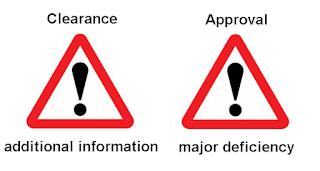Nanox has a problem with the terminology it is using - is it innocently incompetent or intentionally misleading?
Nanox typically, but not always (see below), claims to have submitted for FDA clearance (aka 510(k)) rather than FDA approval (aka PMA). In its draft registration statement filed July 30, 2020, the company states:
In response to the feedback we received from the reviewer, we are conducting standard functional and safety tests to support the 510(k) application, and expect to submit the results from these tests in the third quarter of 2020. (page 1)
Just two weeks later, that statement became:
As part of the review process, in March 2020, we received an additional information request, referred to as a major deficiency letter, from the Review Organization which, among other things, required us to provide additional data and other information to complete the application and to address certain deficiencies highlighted by the reviewer, including the results of certain performance tests. In response to the feedback we received from the Review Organization, we have conducted additional product testing and expect to submit the results from these tests, along with our response, to the Review Organization, in the third quarter of 2020. (page 1)
Ok, feedback sounds less ominous than a request for additional information, but why, oh, why did Nanox have to mention a major deficiency letter? Why didn't it just put a "deficiency letter," without the "major?" See,
FDA refers to PMA ... deficiency letters as “major deficiency letters” and 510(k) ... deficiency letters as “additional information letters” or “requests for additional information.” (page 2)
And, yes, the reviewer - the Third Party - can send "requests for additional information," according to the overview published by the FDA.
So, again, why not just write "a request for additional information?" Why confuse anyone reading the filing (and Prospectus) with the addition of the "major deficiency letter," which would imply seeking FDA approval rather than clearance?
Here is an excerpt from the busy Slide 3 titled "Nanox at a glance" in Nanox investor presentation dated January 14, 2021 stating that Nanox expects FDA approval, although this appears to refer to an upcoming submission of the fancy multi-source device (in which case, approval is impossible in Q1 2021, because it takes years of human trials, unlike simple clearance within 90 days).


No comments:
Post a Comment